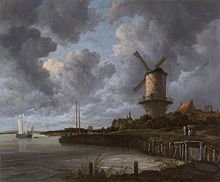
Back ياكوب فان روسيدل Arabic جاكوب فان روسيدل ARZ Yakob van Röysdal Azerbaijani Якоб ван Ройсдал Bulgarian ইয়াকব ভ্যান রাইস্ডেল Bengali/Bangla Jacob van Ruisdael Breton Jacob van Ruisdael Catalan Jacob van Ruisdael Czech Jacob van Ruisdael Welsh Jacob van Ruisdael Danish
Jacob van Ruisdael | |
|---|---|
 Windmill at Wijk bij Duurstede (c. 1670) | |
| Born | Jacob Isaackszoon van Ruisdael 1628 or 1629 |
| Died | 10 March 1682 Amsterdam, Dutch Republic |
| Known for | Landscape painting |
| Notable work | The Jewish Cemetery, Windmill at Wijk bij Duurstede, View of Haarlem with Bleaching Fields, The Ray of Light, A Wooded Marsh |
| Movement | Dutch Golden Age |
| Patron(s) | Cornelis de Graeff (1599–1664) |
Jacob Isaackszoon van Ruisdael (Dutch pronunciation: [ˈjaːkɔp fɑn ˈrœyzˌdaːl] ; c. 1629 – 10 March 1682) was a Dutch painter, draughtsman, and etcher. He is generally considered the pre-eminent landscape painter of the Dutch Golden Age, a period of great wealth and cultural achievement when Dutch painting became highly popular.
Prolific and versatile, Ruisdael depicted a wide variety of landscape subjects. From 1646 he painted Dutch countryside scenes of remarkable quality for a young man. After a trip to Germany in 1650, his landscapes took on a more heroic character. In his late work, conducted when he lived and worked in Amsterdam, he added city panoramas and seascapes to his regular repertoire. In these, the sky often took up two-thirds of the canvas. In total he produced more than 150 Scandinavian views featuring waterfalls.
Ruisdael's only registered pupil was Meindert Hobbema, one of several artists who painted figures in his landscapes. Hobbema's work has at times been confused with Ruisdael's. Ruisdael always spelt his name thus: Ruisdael, not Ruysdael.
Ruisdael's work was in demand in the Dutch Republic during his lifetime. Today it is spread across private and institutional collections around the world; the National Gallery in London, the Rijksmuseum in Amsterdam, and the Hermitage Museum in St. Petersburg hold the largest collections. Ruisdael shaped landscape painting traditions worldwide, from the English Romantics to the Barbizon school in France, and the Hudson River School in the US, and influenced generations of Dutch landscape artists.